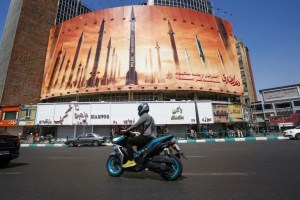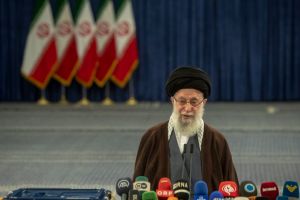On a sweltering day in July 2018, German police pulled over a scarlet Ford S-Max hire car that was traveling at speed towards Austria. The driver, Assadollah Assadi, the third secretary to the Iranian embassy in Vienna, was arrested at gunpoint and taken into custody.
Although unusual, there was a good reason for detaining the diplomat: Assadi had used his immunity to smuggle a bomb on a commercial airliner from Tehran to Austria, intending to carry out what would have been one of Europe’s worst atrocities in recent years.
Once in Vienna, he had handed the device — codenamed the ‘Playstation’ — to two married Belgian-Iranian agents, Amir Saadouni and Nasimeh Naami, and instructed them to blow up an anti-regime event in Paris, which was to be attended by dignitaries including Rudy Giuliani and former environment secretary Theresa Villiers.
The plot was thwarted on the day of the attack after a tip-off from Mossad, saving hundreds of lives. Assadi was arrested the following day while pursuing diplomatic refuge in Austria. But as we reported in this week’s Jewish Chronicle, the treasure trove of evidence inside the vehicle should have set off alarm bells in European corridors of power — alarm bells that should be sounding especially loudly today.
The car was effectively being used as a mobile intelligence station to run agents. It contained handwritten records of trips to 289 locations in 22 cities across Europe as well as notes on bomb handling and ideas for attacks using acid and toxic pathogenic substances. Also discovered were receipts for expense reimbursements and salary payments to spies, details of computers issued to them, numerous mobile phones and GPS devices, and more than €30,000 ($35,700) in cash. In short, it revealed an Iranian espionage network in Europe that was startling in both its scale and scope.
When seen in the light of the political context at the time, the arrest seemed almost ironic. Not eight weeks previously, Donald Trump had pulled America out of the nuclear deal with Iran, the Joint Comprehensive Plan of Action (JCPOA), reimposing ‘maximum pressure’ sanctions on the theocracy. The Europeans were appalled.
One of Washington’s main reasons for leaving the deal, signed by the Obama administration in 2015, was that lifting sanctions allowed Tehran to fund extensive terror networks, proxy militia and missile emplacements overseas. But even while investigators were poring over the material found inside Assadi’s scarlet Ford S-Max, policymakers in Europe’s capitals were busy designing a mechanism to allow Iran to continue to trade behind the backs of the Americans. The system, known as ‘Instex’, was launched five months later, in an attempt to neuter the deterrent from Washington.
This bizarre state of affairs cannot be overemphasized. Exhibit A: Tehran activates its extensive spy network in an attempt to blow up hundreds of civilians on the streets of Paris. Exhibit B: the Europeans try to undermine American pressure on the theocracy, shoveling more money into its maw. A cynic might call it suicide by diplomacy.
This week, history is repeating itself. Eight weeks ago, an Antwerp court sentenced Assadi and his three co-conspirators to between 15 and 20 years in prison. This was the first conviction of an Iranian official for terrorism offenses since the 1979 Islamic revolution. Yet this week, the European powers pressed ahead with direct negotiations with Tehran in Vienna, aimed at expunging all trace of the Trump years and restoring the nuclear deal. By all accounts, progress was swift: a few days of discussions resulted in a ‘roadmap’ that could lead to a new agreement in as little as two months.
The Ayatollahs have never been in any doubt that the Europeans are in the palms of their hands. The only sanctions insisted on by Europe last week were symbolic restrictions on a small number of Iranian officials, a gesture of solidarity for dual nationals held hostage in Iranian prisons. Aside from this, there was simply no disguising the enthusiasm for welcoming the malignant theocracy back into the fold.
To make matters worse, in the post-Trump era, Washington is equally wide-eyed. Returning to the Obama deal has become a political pose to this new administration, which pursues it like an article of faith. It took Joe Biden just 11 weeks to go from being elected as 46th president of the United States to commencing new nuclear negotiations with Iran.
In fact, even before he entered the Oval Office, Biden had publicly telegraphed his intentions to reheat Obama’s JCPOA. In an article for CNN last September, he argued that President Trump had ‘recklessly tossed away a policy that was working to keep America safe and replaced it with one that has worsened the threat’. The Iranians, shall we say, were hardly kept guessing about America’s negotiating objectives. This was the David Cameron-Theresa May school of negotiations that produced such truly exemplary results during the Brexit era.
Unsurprisingly enough, Tehran’s foreign minister, Seyed Araghchi, opened the talks by playing hardball, insisting that all sanctions imposed since 2016 — including those unrelated to its nuclear programme — be lifted before any return to compliance. This would mean a fresh wave of dollars breaking on the shores of the Islamic Republic, allowing it to kick-start its beleaguered economy with oil exports and return to a fully functional banking system. Only then — with the influx of cash being toasted by terror cells from Sudan to Vienna — would the theocracy consider curtailing its nuclear ambitions. Or rather, consider agreeing to do so.
The United States, negotiating at arm’s length via its European allies around the table in Vienna, responded feebly by suggesting a step-by-step approach. ‘I think what essentially ruled out are the maximalist demands that the United States do everything first and only in turn would Iran then act,’ Ned Price, the State Department spokesman, said. But there was never any doubt about the American endgame.
There are two Iranian spy networks in the West. The first, Department 312 of Tehran’s Ministry Of Intelligence and Security, aims at infiltrating, intimidating and assassinating Iranian dissidents who have gone into exile to campaign against the theocracy. That is the ring that was exposed in 2018 and is now being rebuilt.
The second targets Israelis, whether representatives of the state or civilians. The latter espionage group has the more difficult task. Iran knows full well that any aggressive action against Israeli citizens will meet with swift retaliation.
Israel, as the single country most threatened by Tehran (intelligence sources estimate that 80 percent of threats against the Jewish state emanate from the theocracy) does not, shall we say, buy into the transatlantic policy of appeasement. Last week, Benjamin Netanyahu made his position clear ahead of a visit to Jerusalem by the new US secretary of defense, General Lloyd Austin, a visit designed to calm Israeli nerves over the impending nuclear deal. ‘These type of deals with extremist regimes are worth nothing,’ he said. ‘A deal with Iran that threatens us with annihilation will not obligate us.’
Speaking on Holocaust Remembrance Day, he added: ‘Only one thing will obligate us: to prevent those who wish to destroy us from carrying out their plans.’ On Sunday, an unexplained ‘incident’ occurred at Iran’s nuclear facility in Natanz — which had just started using more advanced centrifuges — taking out its electrical distribution grid.
In sharp contrast with Israel, whatever the opposite of retaliation is, Europe is following that policy. In the somnambulant haze that hangs in the continent’s corridors of power, even a fully armed bomb, built in Tehran and on its way to delivery to a rally of thousands of people in central Paris, is not enough to raise serious hesitations abut the intentions of the Iranian regime. The planned attack in the heart of France was generally viewed, amazingly enough, as an internal Iranian issue. The security services uprooted the spy network, then returned to business as usual. As one source familiar with the matter told me: ‘The plot may have been a wake-up call, but the Europeans tend to wake up from time to time, then fall asleep again.’ And this time, Europe and America are in lockstep. One can only hope that they are not sleepwalking to their own destruction.
This article was originally published on The Spectator’s UK website.


















